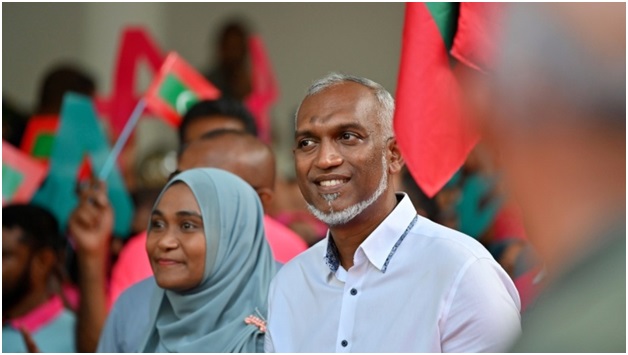Presidential Election in Maldives and India (The Hindu)

- 02 Oct 2023
Why is it in the News?
Mohamed Muizzu, the leading candidate from the Opposition, has secured the position of President in the Maldives. He emerged victorious in a closely contested election, defeating the incumbent Ibrahim Mohamed Solih, who had friendly relations with India.
News Summary About Maldives Presidential Election:
- The Maldives has chosen Mohamed Muizzu as its new president, ousting the incumbent Ibrahim Mohamed Solih, known for his pro-India stance.
- President Solih faced criticism from the Opposition for his 'India first' policy.
Key Points:
- In the second round of the Presidential Election, Mr. Muizzu secured approximately 54% of the vote, while Mr. Solih garnered nearly 46%.
- The run-off election witnessed a higher voter turnout of 86%, surpassing the 79.85% recorded in the first round, which was the lowest in Maldivian presidential election history.
- The initial round did not produce a clear winner, as no candidate managed to obtain more than 50% of the votes.
Electoral System in the Maldives:
- Parliament Name: The legislative body in the Maldives is known as Majlis or People's Majlis.
- Parliament Structure: Maldives follows a unicameral parliamentary structure.
- First-Past-the-Post Majority System: In the Maldives, both Parliament and Council elections utilize the first-past-the-post majority system, where voters cast their ballots for a single candidate.
- Term Duration: The Majlis consists of 87 members, each directly elected for a five-year term from 87 individual single-member constituencies.
- Two-Round System: The President of the Maldives is elected using a two-round system.
- If no candidate secures more than 50% of the votes in the first round, a second round or run-off is conducted.
- 2023 Maldives Election: The initial round of the election featured eight candidates, marking the highest number of candidates so far.
- The Maldives has a population of approximately 5.2 lakh people.
- As per the Election Commission of the Maldives, there are 2.8 lakh eligible voters, with around 1.6 lakh being members of various political parties.
Evolution of the Executive Presidency System in the Maldives:
- Single-Party System Until 2008: The Maldives operated under an Executive Presidency system since 1968.
- It adhered to a single-party system until 2008, where the President was elected for a five-year term through a referendum.
- Maumoon Abdul Gayoom's 30-Year Rule: Ibrahim Naseer served as the first executive President from 1968 to 1978.
- Due to political protests in 1978, Naseer did not seek re-election for a third term.
- In 1978, the Maldivian parliament selected Maumoon Abdul Gayoom as the succeeding President.
- Gayoom led the nation for an astonishing 30 years, until 2008, effectively managing protests and famously thwarting a coup attempt with India's assistance in 1988.
- Era of the Multi-Party System: In response to protests by various factions, Gayoom initiated political reforms in 2004.
- Political parties were officially registered in 2005, and a new Constitution was adopted in 2008.
- These changes paved the way for Presidential elections every five years, embracing a multi-party system.
India's Engagement with Maldivian Politics:
- India's relationship with Maldivian politics has been a blend of experiences, with the Solih government being the most favorable thus far.
- India collaborated closely with Abdul Gayoom's administration for three decades.
- When Mohamed Nasheed assumed power in 2008, India expressed its support through then Vice President Hamid Ansari's attendance at his inauguration ceremony.
- Tensions arose in 2012 when the Maldivian government terminated the GMR contract for the Maldives' airport, straining the bilateral relationship significantly.
- Following Yameen's rise to power in 2013, he pursued a more aggressive courtship with China.
- During his tenure, the Maldives joined President Xi Jinping's Belt and Road Initiative.
- When India and Western lenders hesitated to extend loans to Yameen's government due to allegations of human rights violations, he turned to Beijing, which provided funding without stringent conditions.
- Solih's victory in the 2018 elections was met with relief in Delhi.
- Prime Minister Modi even attended Solih's swearing-in ceremony during his visit to the Maldives.
Potential Shift in Maldives' Foreign Policy:
- The victory of Muizzu might indicate a possible adjustment in the Maldives' foreign policy.
- He enjoys the support of former President Abdulla Yameen, known for his pro-China stance and 'India out' campaign.
- Despite this, local observers in the Maldives believe that Mr. Muizzu is unlikely to abruptly sever ties with India.
- The newly elected leader is expected to pursue a balanced approach in managing India-China relations.
- Meanwhile, India hopes for the continuity of its various infrastructure projects in the Maldives.
- India's recent initiatives in the Maldives encompass a wide range of projects, including water and sanitation in 34 islands, road construction, land reclamation as part of the Addu development project, a cancer hospital, a port project, a cricket stadium, two airport development projects, the Greater Male connectivity project with bridges, causeways, and roads, social housing projects, mosque renovations, and the establishment of the national college for police.
- Estimates indicate that Indian aid to the Maldives from 2018 to 2022 exceeded Rs 1,100 crore, more than double the amount provided in the preceding five-year period (approximately Rs 500 crore).
Mains Question:
- Evaluate the potential shifts in the Maldives' foreign policy under President Mohamed Muizzu, and elucidate the impact on its relationship with India, given historical dynamics and infrastructure projects. (15M)
